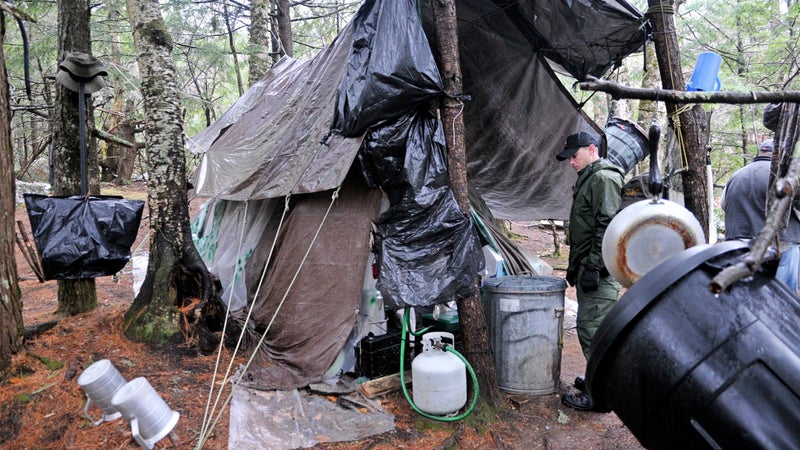Update: The Stranger in the Woods has been chosen as the next book. Author Michael Finkel will be joining us for a podcast conversation and a Facebook group Q&A in the coming month; stay tuned for more details.
In April 2013, Sergeant Terry Hughes caught a man breaking into the walk-in fridge of a summer camp for disabled children in central Maine. This was the end of the hunt for Maine’s legendary North Pond Hermit, Christopher Knight.
It was a moment akin to catching the yeti snatching hikers off a Himalayan mountainside. Except, in this case, the yeti shaved, and some people wistfully thought they might want to live like him—to run off into the woods, hear birds sing, watch water ripple, see snow drop, and rediscover the ideal of unalloyed individualism. Knight did it for nearly 30 years. In ($26; Knopf), author Michael Finkel uncovers the minute and astonishing elements of Knight’s story. These six made us do a double take.
He Didn’t Talk to Anyone for 27 Years
Well, Knight did bump into a hiker once. That day, he looked up, nodded, and said, “Hi.” Then Knight walked on, because he didn’t feel like talking—and he didn’t talk for the other nearly 10,000 days he spent in the woods. When people are suffering, we tell them, “You’re not alone.” When they feel the need to be understood, we tell them, “I hear you.” When we want to punish people for extreme offenses, we isolate them. The United Nations defines that last idiosyncrasy of ours as torture, by the way. And yet Knight chose to forget the sound of human voices and let his own voice fade. The night he was captured and questioned, his sentences were “stuttery and clanky, an old engine struggling to turn over, each syllable a chore,” as Finkel describes in the book.
He Was Just 20 When He Began His Seclusion
When Knight walked into the woods in 1986, he had never been on a date or even spent a night in a tent. One day, he drove his Subaru as far as roads would take him into the Maine woods, less than an hour from where he grew up. He left the keys on the dashboard and started walking south. There weren’t many indicators that Knight wanted to abandon human contact so completely—he was following some sort of inner directive that worked on a level removed from logic. He told Finkel, “I had no plans when I left, I wasn’t thinking of anything. I just did it.” Knight had a fairly normal childhood in an unusually resourceful, slightly reclusive New England family. At the time, he was working installing alarm systems and had just bought the new car. No one expected it, not his school friends or even his brother, who had helped fund the Subaru and would be saddled with the debt for it. One day, Knight simply decided that he would live a life of his own design.
He Lived So Close to a House That He Couldn’t Sneeze Aloud
For the vast majority of time he spent in the woods, Knight lived about a three-minute walking distance from the nearest cabin and a washboard road, on a 220-acre parcel of land where other simple summer homes were set in the woods along the lake. To avoid detection, he never lit a campfire and tried to avoid sneezing. He built his long-term woodland encampment in an essentially invisible clearing between two boulders, using tarps, garbage bins, and many issues of National Geographic (great for water drainage—Knight created a level platform in his living space with duct-taped bundles of magazines). He was constantly tinkering with the shelter, but no matter the adjustments Knight made, it never provided much warmth. So, in the intense Maine winters, he froze but survived. Knight would lie under a mass of blankets and force himself to wake in the coldest parts of the night. “What he did in the cold was both prosaic and profound,” Finkel writes. “He suffered.”
He Broke into More Than 1,000 Buildings Before Getting Caught
Though he suffered, Knight did find a surprising amount of sustenance in other people’s homes. He was an expert burglar. Using skills that lingered from the alarm-installation job, Knight left no trace. Rather than break down doors, he would take them off their hinges and put them back on later. Most of his neighbors only noticed they’d been robbed when they found that food, sleeping bags, clothes, magazines, books, alcohol, or candy were missing. This kleptomaniacal mode of survival was subtle, but it was so consistent that Knight ended up creating a mood of unease in the cabin community, most of whom were seasonal residents who used the cabins for their own escapes during the summers. “All Patterson wanted from her cabin was a place to escape the pressures of daily life,” writes Finkel of one of the victims. “Knight denied her that.” All solitude comes at a cost, whether for the secluded or those who surround him.
There Is an Online Hermit Community That Thinks He’s Overrated
Much of the hermit community objected to Knight’s particularly parasitic mode of existence. Yes, there is a hermit community, with an online forum at . Many of the hermits on that forum declared that Knight couldn’t be considered a real hermit because he stole things. Knight himself agrees—he that he does not consider himself a hermit but a thief. Still, many other modern-day hermits actually live in their parents’ basements or analogous internet-connected pits and have meals slipped through a crack in the door while they chat online with their hermit friends. In Japan, there are more than half a million of this sort of hermit. They’re known as hikikomori and are that the Japanese Ministry of Health, Labor, and Welfare has studied their condition.

Conceptually, it might seem weird that all these hermits, Knight among them, would choose to rely on society in some way. Actually, most of history’s known hermits have interacted with their societies to varying degrees. There were the walled-off medieval anchorites who ate meals slipped through slots by servants, and then slipped excrement back out. Then there was Everett Ruess, who showed up at a shop every once in a very long while before disappearing again into the desert with his mules. Even the Unabomber sent off his explosive missives through the postal service from his woodland lair. If there were hermits who’ve never had to interact with society, we’ve never heard of them (for obvious reasons). But Knight does stand out for going the longest period without human contact.
He Hates Henry David Thoreau
When Knight was captured, a media storm broke over the Kennebec County Jail as journalists descended from around the world to rattle him like hail. All of them, including Finkel, tried to glean hermit wisdom in the process. In the end, the only major insight Knight expressed to Finkel was “get enough sleep.” The pithiness and grounded practicality of that advice isn’t entirely surprising. It was unlikely that Knight would ever come up with ethereal maxims, memorable aphorisms, or spiritual nuggets. He branded Thoreau a “dilettante” and said others like him who published and commodified their thoughts were false hermits. What Knight took from the woods were not grand cosmic insights, but memories of a time when he was attuned to the nature, beautiful and brutal, around him. He remembered how on the warmest days of the year, the pond would be warm and he would strip and float in it, gazing at the stars. Though he lost track of time, Knight eagerly anticipated the days around the Fourth of July. Rather than recalling gawking at fireworks with a drunken mass, Knight remembered those times because he could sit back and watch as the pitch-black forest around him filled with fireflies.


